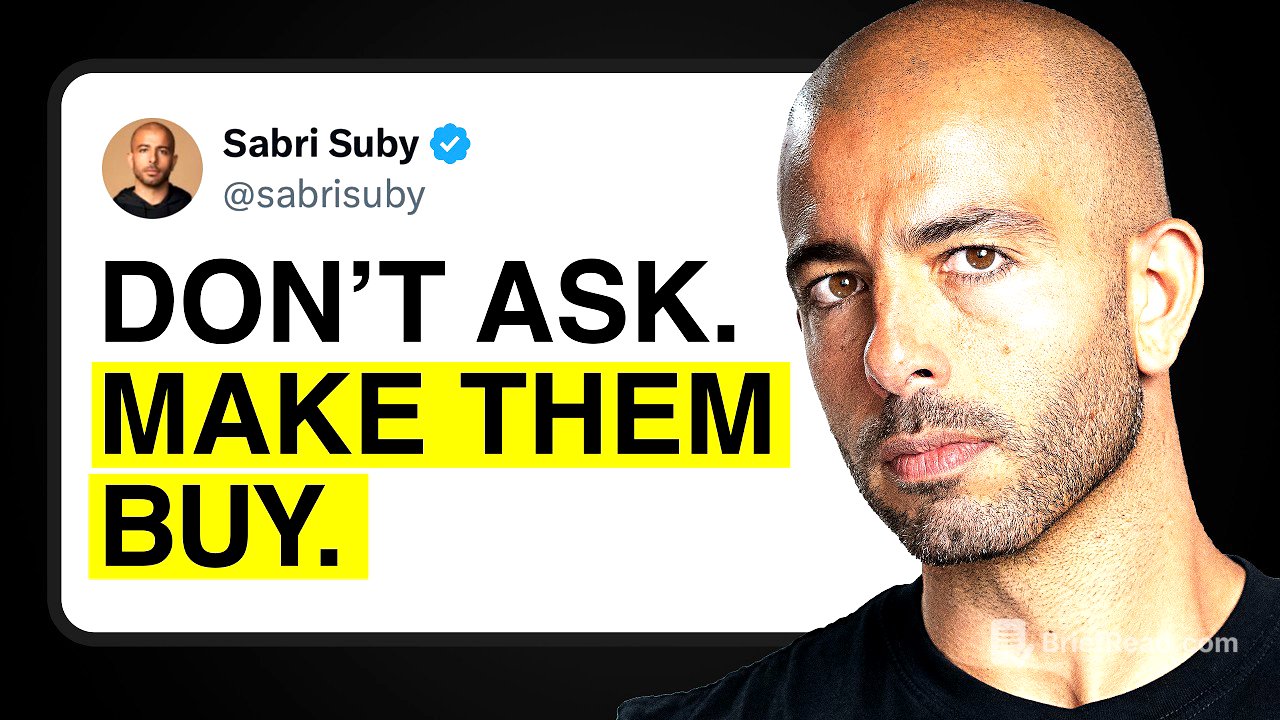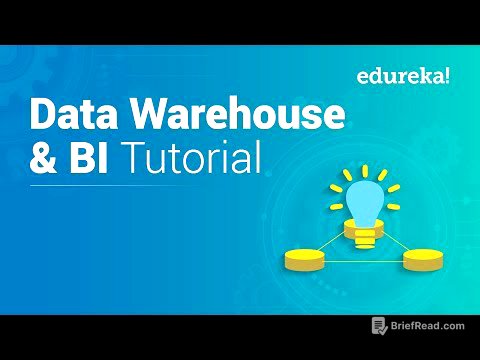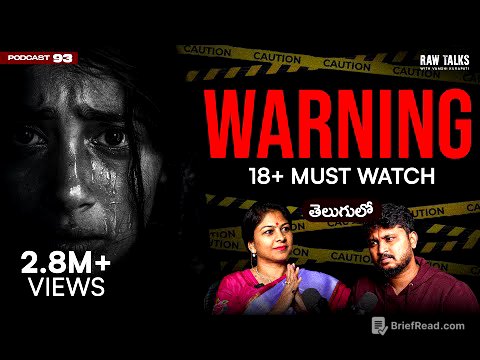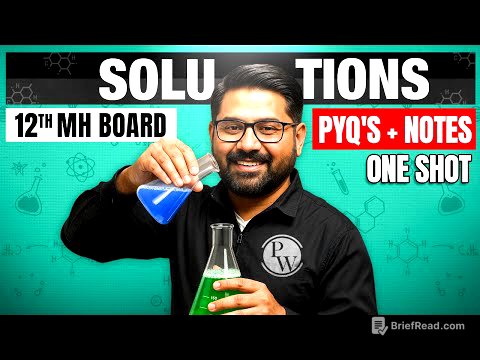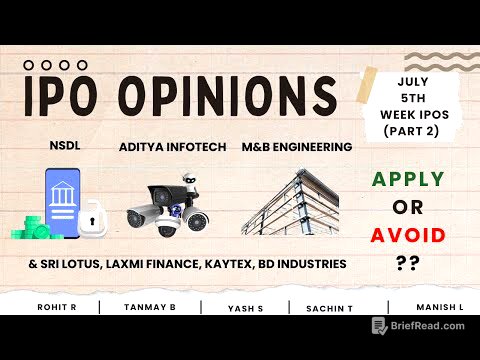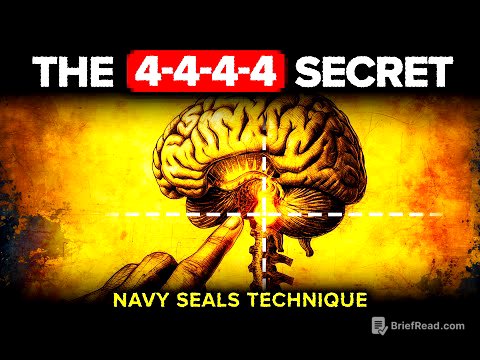TLDR;
Alright, so, this video is all about marketing lessons from Sabri Suby, who's like, a big shot in the marketing world. He's sharing his experiences, the mistakes he's made, and how you can shortcut your way to success. Key takeaways include:
- Product and marketing both are important, not one over the other.
- Sell something that the market actually wants.
- Start with direct response marketing before brand building.
- Use organic content to fuel your paid advertising.
- Storytelling is super important.
- Focus on getting attention first.
- Build desire, don't just sell.
- Price based on value, not just cost.
- Transition from being a "chef" to a "business builder".
- Take big swings.
- Master one channel at a time.
- Understand the different segments of your market.
- Play the long game.
- Focus on skills with a long half-life.
- Increase customer lifetime value, not just reduce acquisition cost.
- Do the basics really well.
- Address skepticism with value.
- Create a Godfather offer.
- Use showmanship and service to delight customers.
- Focus on ideas and imagination in the age of AI.
Intro: Sabri Suby's Marketing Expertise [0:00]
Sabri Suby starts by establishing his credibility, mentioning he's generated billions in sales for thousands of clients across various niches and countries. He's got a big team and is even an investor on Shark Tank. The whole point of the video is to share his learnings and mistakes so viewers can fast-track their marketing journey and make more money. According to him, marketing is the most valuable skill one can acquire.
What is Marketing? [0:46]
Marketing is not just about selling products or services; it's also about attracting, getting, and keeping clients. Successful businesses focus on repeat business. You want clients who find you more valuable than anyone else in your market, so you can spend more to get and keep them, and pay your team well.
Product vs. Marketing [1:53]
There are two schools of thought: one says product is everything, the other says marketing is everything. Sabri thinks both are wrong. You need both a great product and great marketing. Many businesses fail because they spend too long perfecting their product without marketing it. On the flip side, marketers with bad products rely on hype, but negative word-of-mouth kills them. The biggest companies have exceptional products and market them exceptionally well.
Sell Something the Market is Starving For [3:49]
Sabri learned this the hard way selling water filters in Australia, where people didn't think tap water was a problem. Launch with a minimal viable product to test the market's appetite. Don't waste time looking for a completely unique idea; instead, look for competitive markets, because that proves there's a need. Market selection is key. You can have the best everything else, but if you're in the wrong market, nothing else matters. Build a business you yourself would want to be a customer of.
Direct Response vs. Brand [5:53]
Direct response is advertising that asks for a direct action, like calling a number or visiting a website. Brand advertising is about building awareness and reinforcing a message. Many big brands started with direct response. While there are successful businesses in both categories, if you don't have a ton of capital, start with direct response. Once you understand your customer, you can start building a brand. Use direct response to make money, then invest that money in improving your product and building your brand.
Organic vs. Paid [9:24]
Some people think you should only use paid advertising, while others think you should only focus on organic content. But both cost something, either money or time. There's no such thing as free advertising. Sabri started with direct selling and then moved to paid ads. He believes organic has huge potential, but wouldn't rely on it alone. Use organic to test hooks and messaging, then turn what works into ads. The customer journey is complex, so you need a combination of both.
Storytelling [11:48]
Storytelling is the most highly leveraged skill you can have. Start by being a good writer and clearly articulating what you want to say. A good writer is a good thinker. Use an app like Hemingway to improve the clarity of your writing. Write and speak at a sixth-grade reading level or below. Communication is a skill you need to practice. Hooks are super important; spend a lot of time on them. Be a student of markets and see what hooks are working. What you say is more important than how you say it.
The First Sale: Attention [16:07]
The very first sale you make is for someone's attention. You're competing with everything else on their phone. If your stuff is boring, you're dead on arrival. The biggest brands win by getting attention first. Ask yourself if your marketing is worthy of your customers' attention, compared to all the other, more entertaining options. Increase consumption by having something entertaining, with strong hooks and good packaging.
Building Desire vs. Selling [18:04]
Marketing's job is to make sales redundant. You should be building so much desire that people are already sold before you even ask them to buy. Think of an Apple store; the salespeople are just order takers. Build enough desire by creating incredible products that solve pressing problems. Articulate the pain points, show how your product solves them, and present your offer as unique and exciting. If people aren't willingly handing over money, you haven't built enough desire.
Pricing [19:57]
Price is what you pay, value is what you get. A transaction happens when value exceeds price. Get into a situation where you have more demand than supply, and then play with price elasticity. Figure out where on the demand curve you need to price your product. Don't just mark up your costs; instead, prescribe a value to the problem your product solves. The more money you make, the more you can invest in your product and service.
The Chef vs. The Business Builder [21:38]
Most people start a business because they love doing something, like cooking. But they end up overworked and underpaid, doing everything themselves. What got you here won't get you there. You need to transition from being the practitioner to being the business builder. Focus on revenue-producing activities so you can hire people. There's a "Death Valley" where you're doing everything yourself, working long hours, and stressed out. Focus on activities that bring in customers so you can hire a team.
Take Big Swings [25:24]
The more success you have, the more you can take big swings. In the beginning, success comes from taking lots of smaller swings. But if you want what others don't have, you need to do what others don't do. Take big, violent, wild swings that no one else in your market is doing.
Master One Channel [26:11]
In marketing, there's demand capture and demand generation. Start by mastering demand capture, which is targeting people who are already searching for what you sell. Demand capture is where the millions are made, but demand generation is where the billions are made. Demand generation is about creating demand through ads, offers, and stories. It requires more skill, but unlocks the most violent scale.
The Larger Market Formula [27:41]
In any market, 3% of people are looking to buy, 7% are in information-gathering mode, 20% are problem-aware, and 60% are not problem-aware. Your skill as a marketer is to be able to go out to those people and get their attention, build desire, and make them an offer. Mastering this unlocks geometric growth.
Quick Fast Money vs. Big Slow Money [29:01]
The longer your time horizon, the bigger the payoff. If you're focused on making as much money as possible right now, you're leaving a lot of money on the table. Play in decades, not years. Amazon lost money for over a decade before making money. In the beginning, focus on quick, fast money, but as you see success, earn the right to play longer games.
Focus on Skills with Longest Half-Life [31:21]
Focus on acquiring skills that will compound throughout your whole career, like leading people, communicating, and writing clearly. Make yourself redundant at every step of the journey so you can focus on those skills that give you the most leverage long term.
Increase LTV vs. Reduce CAC [32:57]
Spend 80% of your time focusing on how to increase the average lifetime value of a customer, and 20% of your time focusing on how to reduce your customer acquisition cost. Don't obsess over lowering your cost per lead. Focus on delivering a better product or service that gets people to buy more or buy more frequently.
Advanced People Do the Basics [34:33]
Advanced people always do the fundamentals. Don't get obsessed with the most advanced and shiny things. If you just do the fundamentals exceptionally well, you will wipe the floor with people who have the most complex funnels and ad targeting strategies.
Skepticism [36:33]
The level of skepticism in all markets keeps increasing. There are more people who are not experts in business, which leads to incompetence and bad experiences. The antidote to skepticism is value. Prove to people that you can help them by actually helping them. Throw stones at the other alternatives that exist and show how they haven't been able to deliver on their promises.
Godfather Offer [39:38]
A compelling offer is infinitely more powerful than a convincing argument. Be aware of the risk in every transaction and burden the majority of that risk as a business owner. The more clearly defined the end benefit, the more compelling your offer is. If the offer doesn't keep the founder up at night, it isn't strong enough.
Showmanship and Service [41:31]
Showmanship is a lost art form. People will forget what you say, but they won't forget how you made them feel. Be a showman in your promotion and in the way you service customers. Surprise and delight your customers. Think about what you can do to create a remarkable experience that people want to tell others about.
AI and the Future of Marketing [43:56]
A lot of manual tasks will be automated by AI. But if everyone is using AI, what will be the differentiator? It's all about the ideas. Imagination is more important than knowledge. People's ability to come up with big ideas and apply their imagination will be key. Solitude is the wind that stokes the flame of creativity. If you want to create more, consume fewer things.
